A Film Director and Novelist’s Apartment Remodel on the Upper West Side
- Get link
- X
- Other Apps
Jan Eliasberg discovered she enjoyed the hands-on, creative experience of her gut renovation
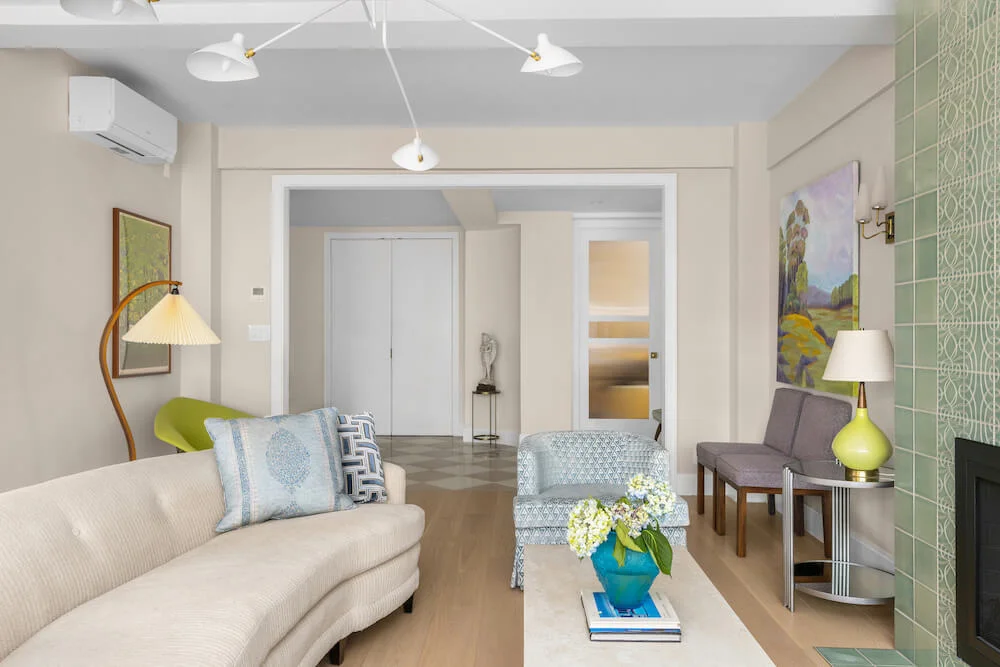
- Homeowners: Screenwriter/director and novelist, Jan Eliasberg posted her apartment remodel on Sweeten
- Where: Upper West Side in Manhattan’s NYC
- Primary renovation: Opening up a 1,750-square-foot penthouse co-op without an open concept while upgrading the entire home
- With: Sweeten general contractor
- Homeowner’s quote: “My Sweeten contractor brought an imperturbable calm that I knew would stand us in good stead when things went pear-shaped (as they inevitably would).”
Written by homeowner Jan Eliasberg. “After” photos by Kate Glicksberg.
Architecture is the “complex or carefully designed structure of something.” By that definition, I’ve been practicing architecture for most of my life. As a film and television director, I envision the ideal structure for telling a story and then, in collaboration with other creative artists, bring that vision into reality.
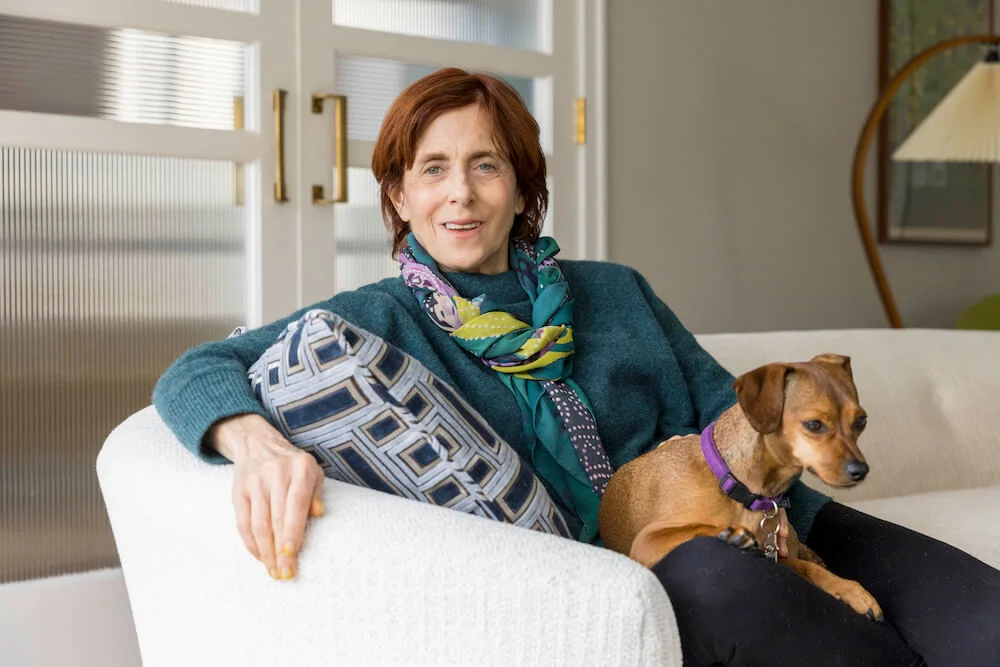
There’s nothing I love more than seeing possibility, an instinct that served me well when I was on the hunt for my NYC apartment. If a listing said, “Bring your toothbrush,” I’d pass, if it said, “Bring your contractor,” I’d rush to make an appointment.
I decided to buy a penthouse apartment before I’d even seen it. It was month three of COVID when the NY Times was announcing that “New York is Dead.” Every article in the home section was about New Yorkers moving permanently to the Hudson Valley, or the Hamptons – anywhere but New York. There were no Open Houses. No one wanted to take on the double whammy of buying an apartment and gut renovating it during a global pandemic, except for someone slightly crazy…like myself.
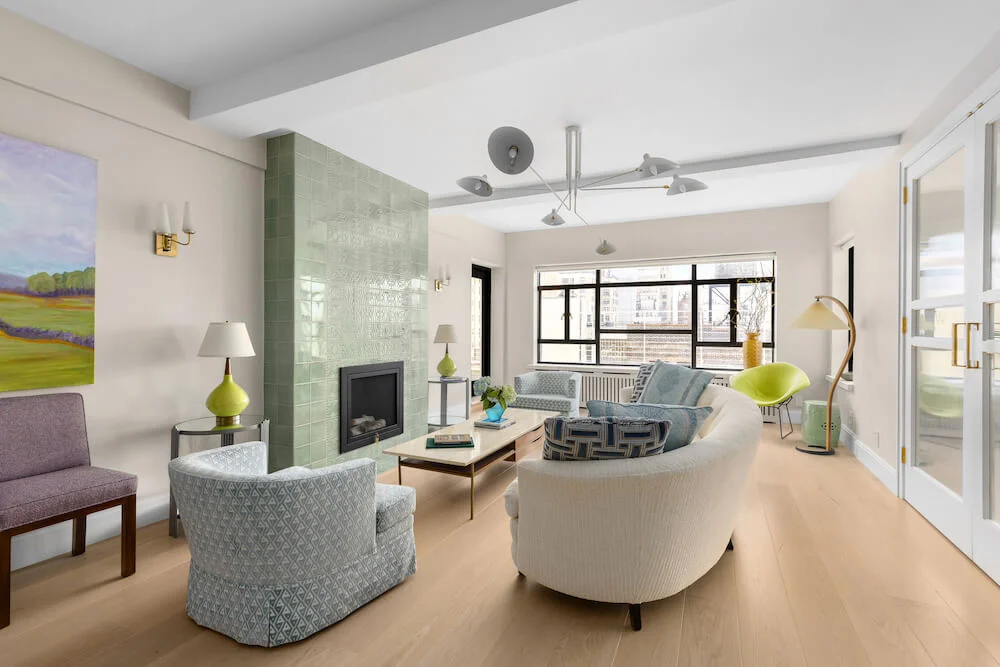
Tackling her gut renovation
The broker’s listing featured a ground plan: a 1,750-square-foot penthouse; spacious rooms; Central Park views; a wrap-around terrace and light from the South, East, and West. What could possibly be bad?
Well…roof leaks and water stains on the ceiling; mold in the closets; linoleum pasted to the floor with asbestos-laced glue; mud brown paint; green shag carpet; and a labyrinthian flow that made me feel like a psychotic rat in an impossibly twisted maze. I held tight to my vision, combed Pinterest for inspirational images, and posted the project on Sweeten.
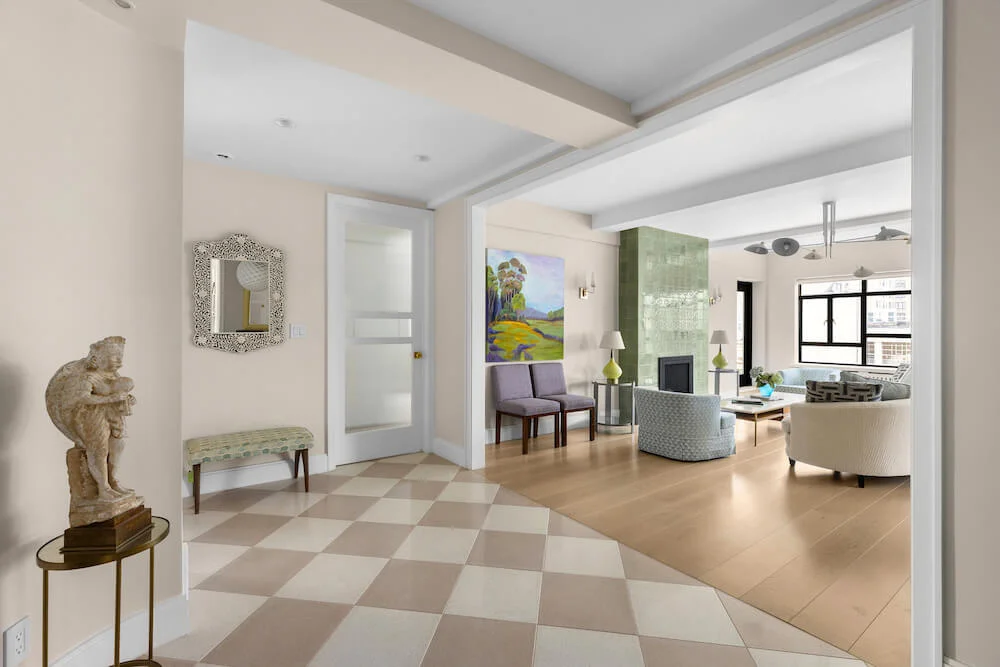
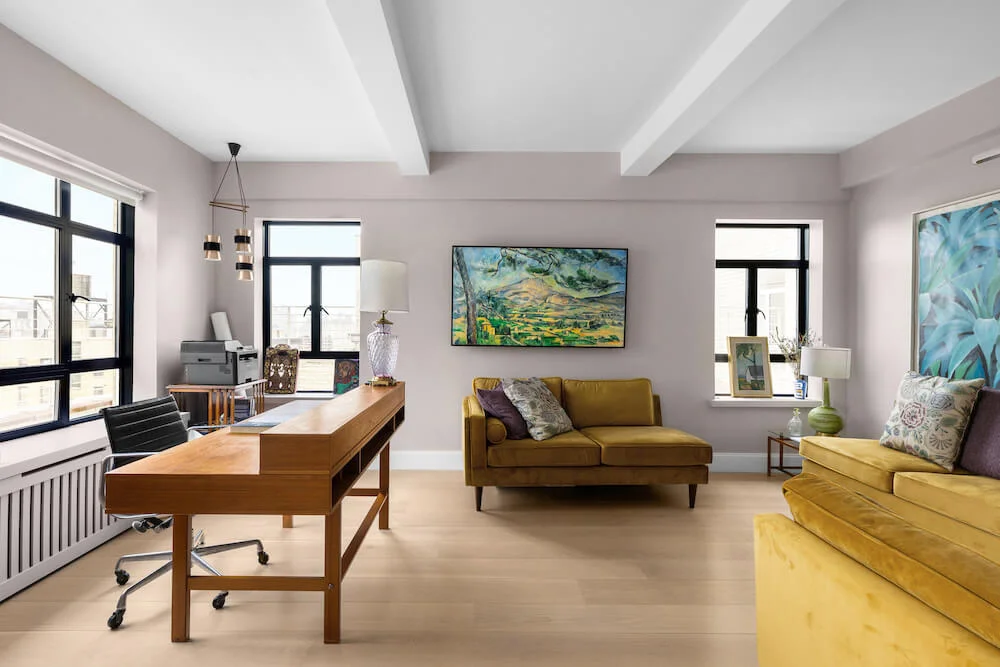
Spreading light throughout
The rooms were already spacious, so I opted against an open concept plan. We created an enormous archway from the dark and confusing entryway into the living room. Suddenly the light from the wall of south facing windows flooded the entryway and illuminated a clear path. We borrowed a design gesture from pre-war New York apartments, connecting the living room and dining room with French doors. The dining room became my dedicated office and screening room (where, as a writer and director, I spend most of my time). It also serves as a third bedroom.
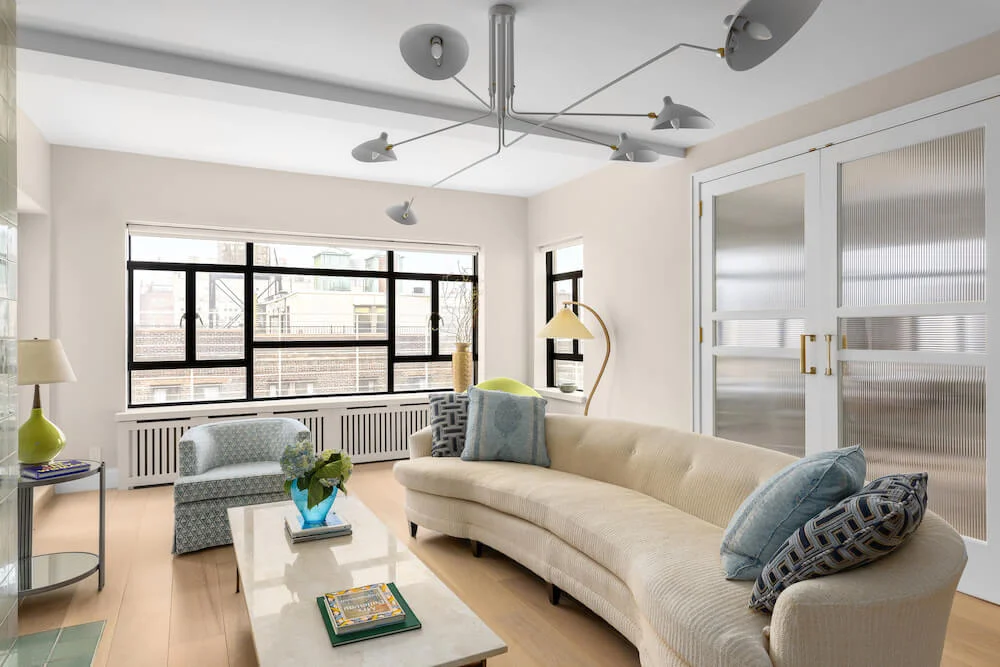
Composing my renovation team
My Sweeten contractor brought an imperturbable calm that I knew would stand us in good stead when things went pear-shaped (as they inevitably would). He introduced me to Danielle Albert, a terrific architect with whom he’d worked on several previous projects.
Together we orchestrated the flow of the apartment with strategic structural alterations. We opened the rooms up to the light, accentuating the streamline moderne elegance of the tall ceilings and original casement windows. And, of course, fixing a multitude of code violations, asbestos hazards, and water-damaged ceilings along the way.
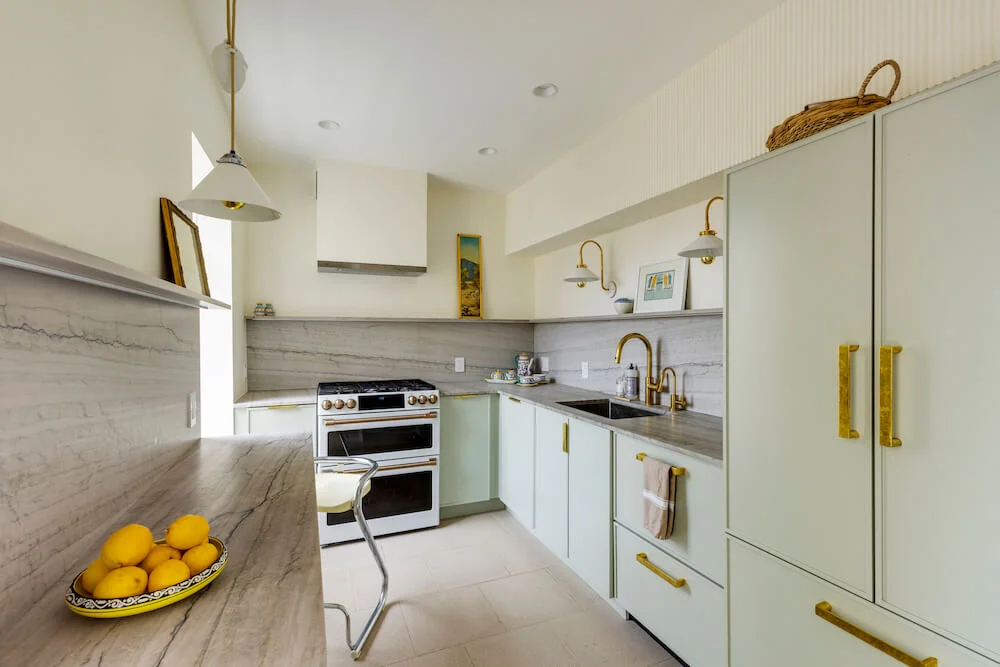
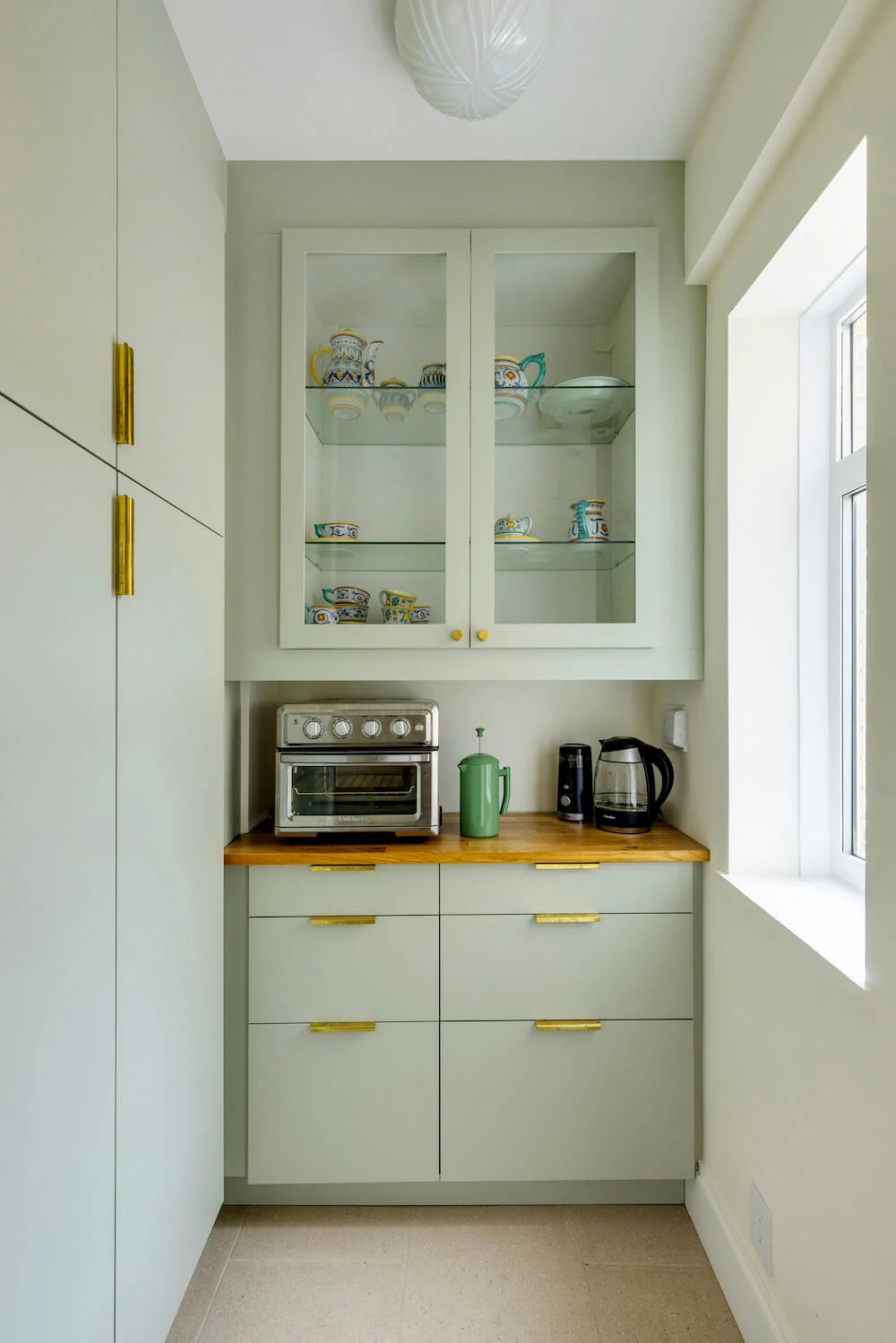
Danielle and I replaced the low, wooden doors with floor-to-ceiling doors featuring enormous panels of fluted glass that echo the pattern of the casement windows. The ribbed glass gives privacy while allowing natural light to stream into every room from two if not three directions.
Overcoming kitchen cabinet challenges
The most challenging aspects of the renovation were the kitchen and the HVAC system. To save money, I did a modified IKEA kitchen. Wanting to maintain as much openness as possible, I opted not to use upper cabinets. Fortunately, Danielle had carved a large pantry out of previously wasted space, so I was able to maximize every inch of storage. I used custom-paneled cabinet doors and drawer fronts from a Canadian company called NIEU. I’m eternally grateful to Julia at NIEU who corrected all my mistakes before I made them.
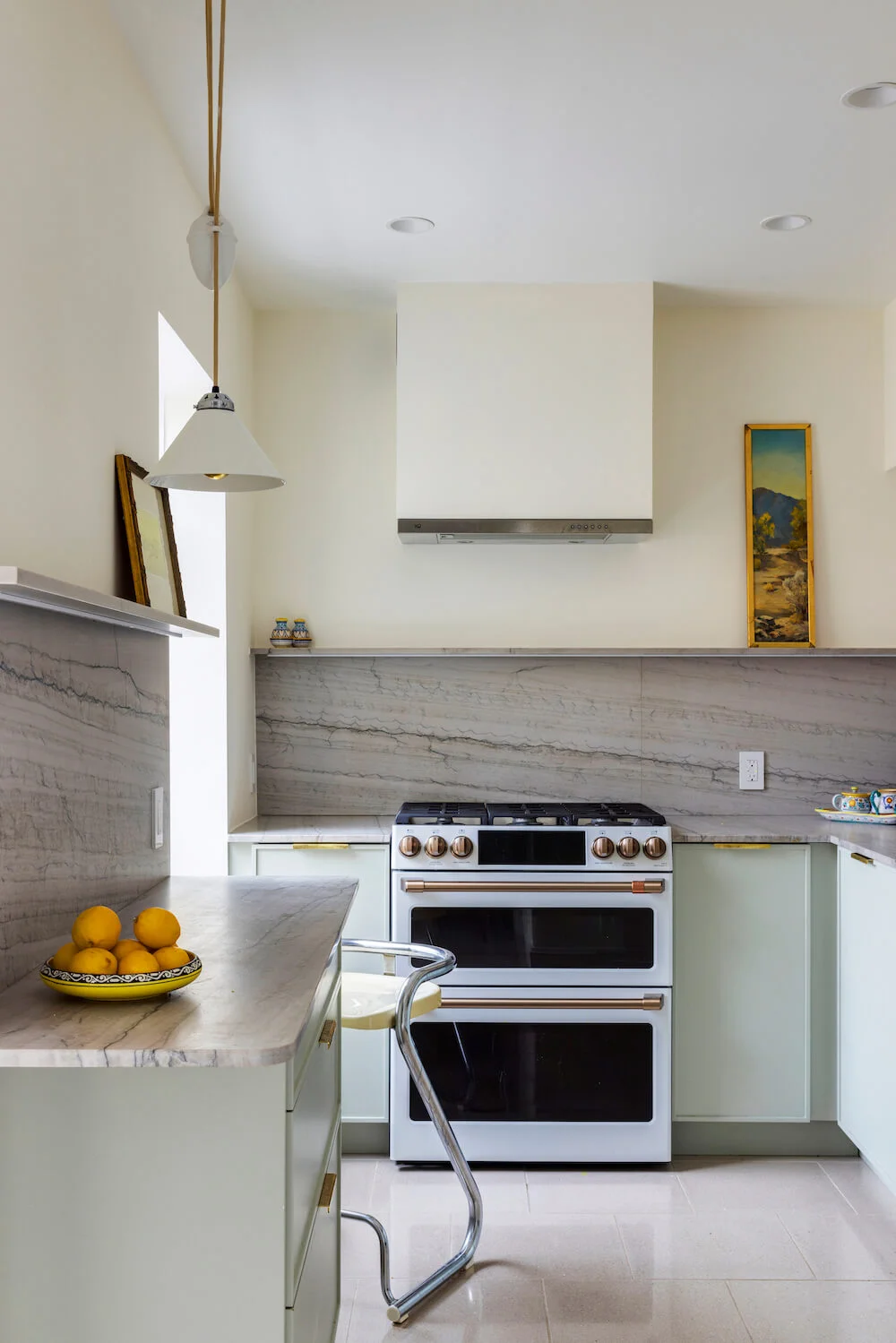
Coordinating with IKEA, however, dealing with their supply chain issues, returning over-ordered parts became so frustrating that I regretted not doing a custom kitchen. That aside, I’m thrilled with the way the kitchen came out. I particular love the sleek lines of the leathered white Macaubus countertops and backsplash, offering the elegance of marble with the easy maintenance and durability of quartzite.
Nature inspires the color palette
To provide a focal point for the 22-foot-long living room, I added a floor-to-ceiling tiled fireplace. I wanted a tile more delicate and playful than Heath with its earth-tone glazes. I’d been a collector of Rookwood pottery when I lived in California. In a stroke of remarkable synchronicity, I discovered that Rookwood had recently re-opened, once again making their fantastically etched and glazed tiles. I chose a pattern called Jazz in a watery blue-green glaze called Wasser.
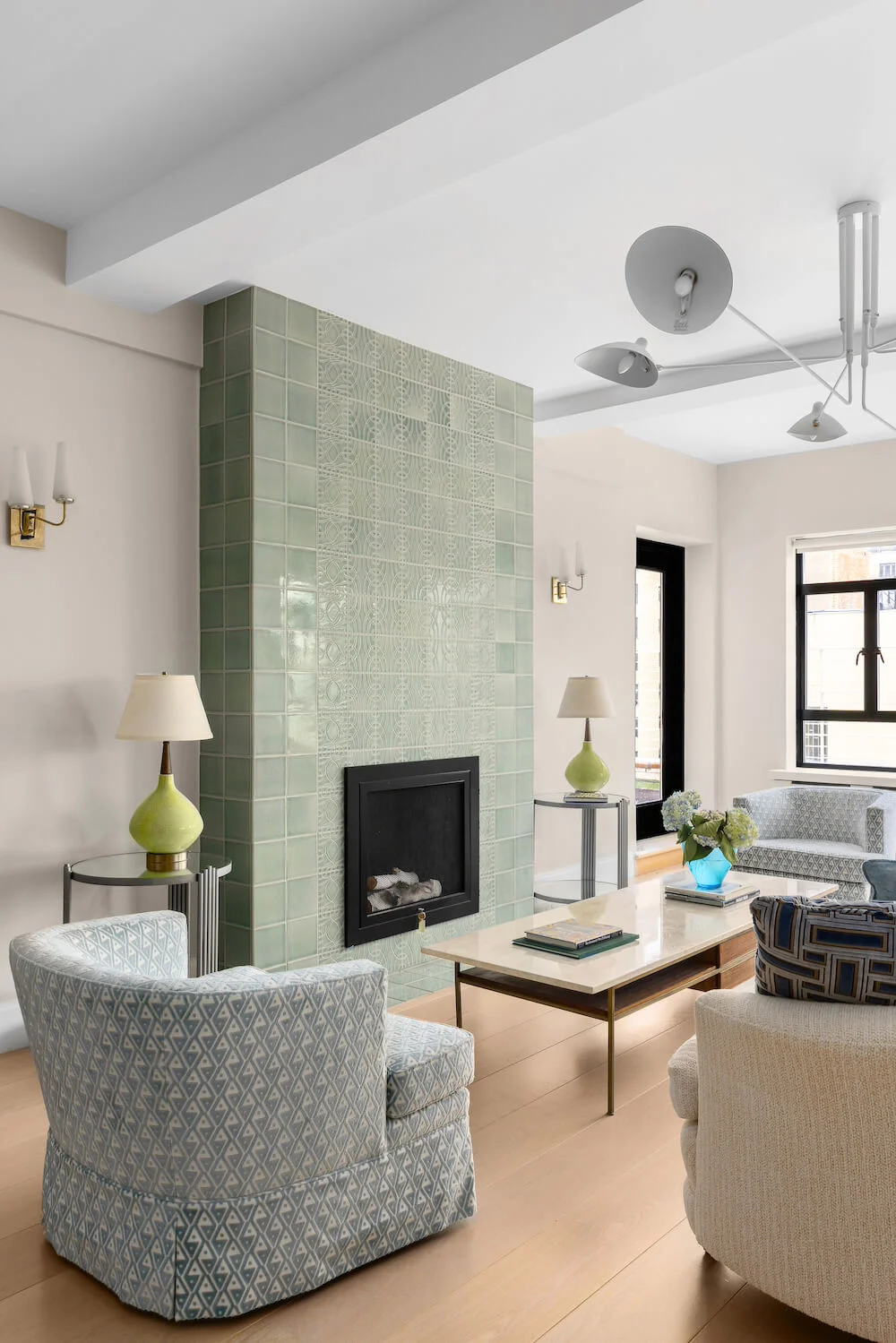
Intentionally choosing a color palette is something I’ve always done in my film work; it unites disparate elements. In design, it allows rooms to echo and harmonize within an overarching theme. Streamline Moderne design reached its peak in America on the sunny beaches of South Beach, Florida. So I instinctively gravitated towards a summer palette: the greens and blues of the ocean; the spun gold of the sun at Magic Hour; a hillside covered with lavender. And anchoring it all, wide natural hardwood planks and 24 x 24 terrazzo tiles in “Ivory” and “Latte.”
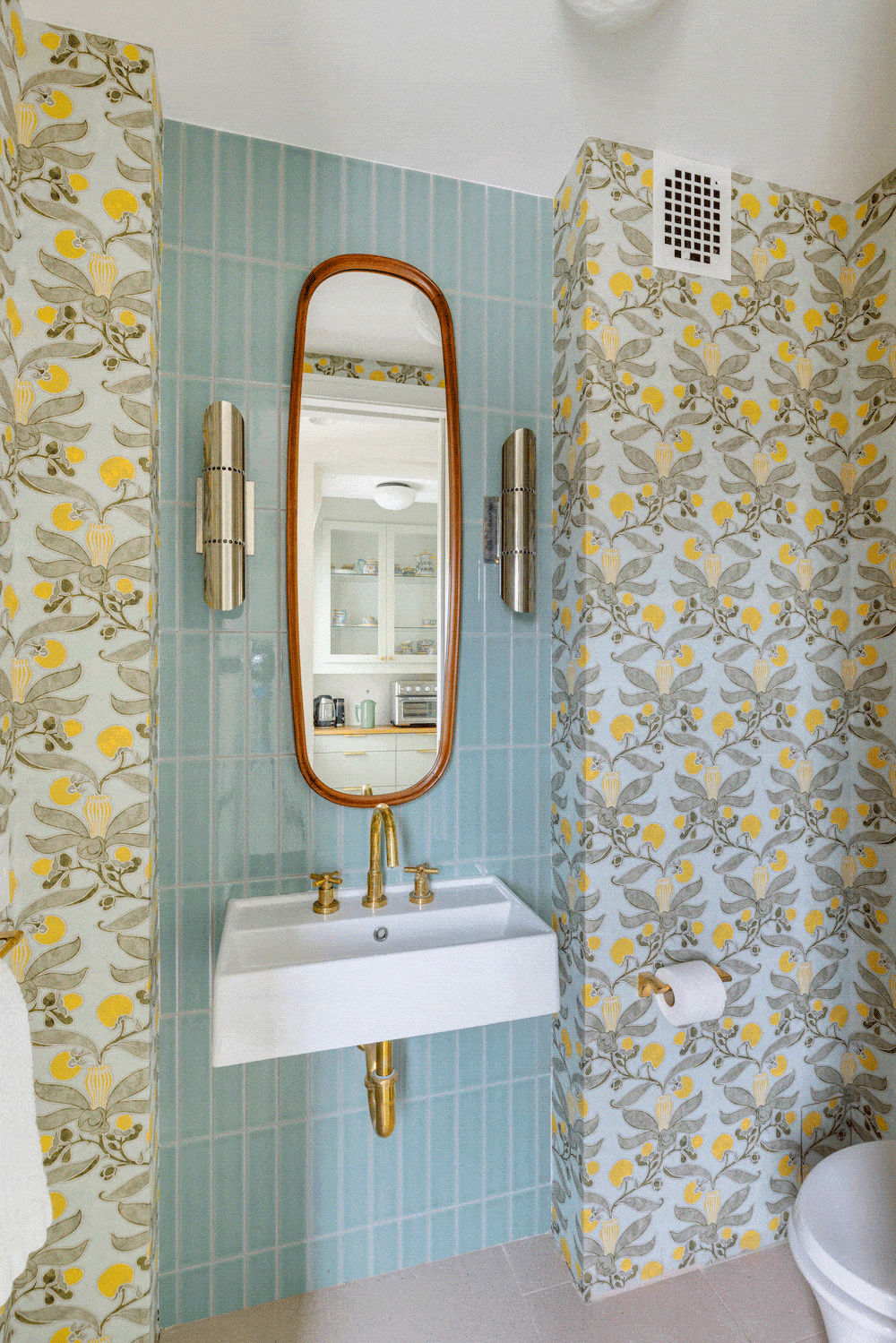
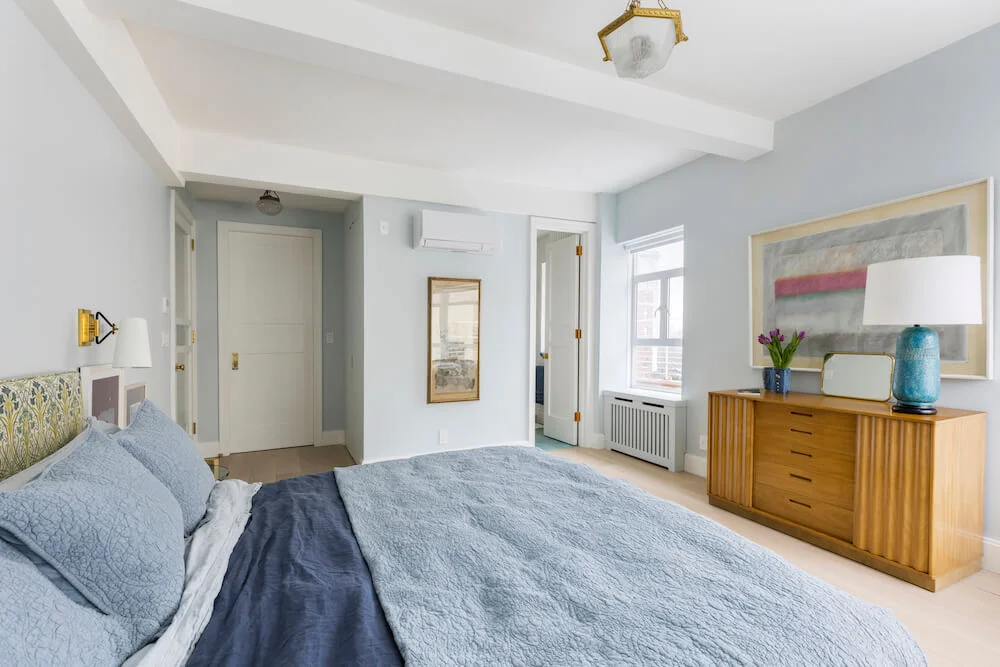
"Fortunately, our contractor was nimbly able to juggle and move forward with other parts of the project."
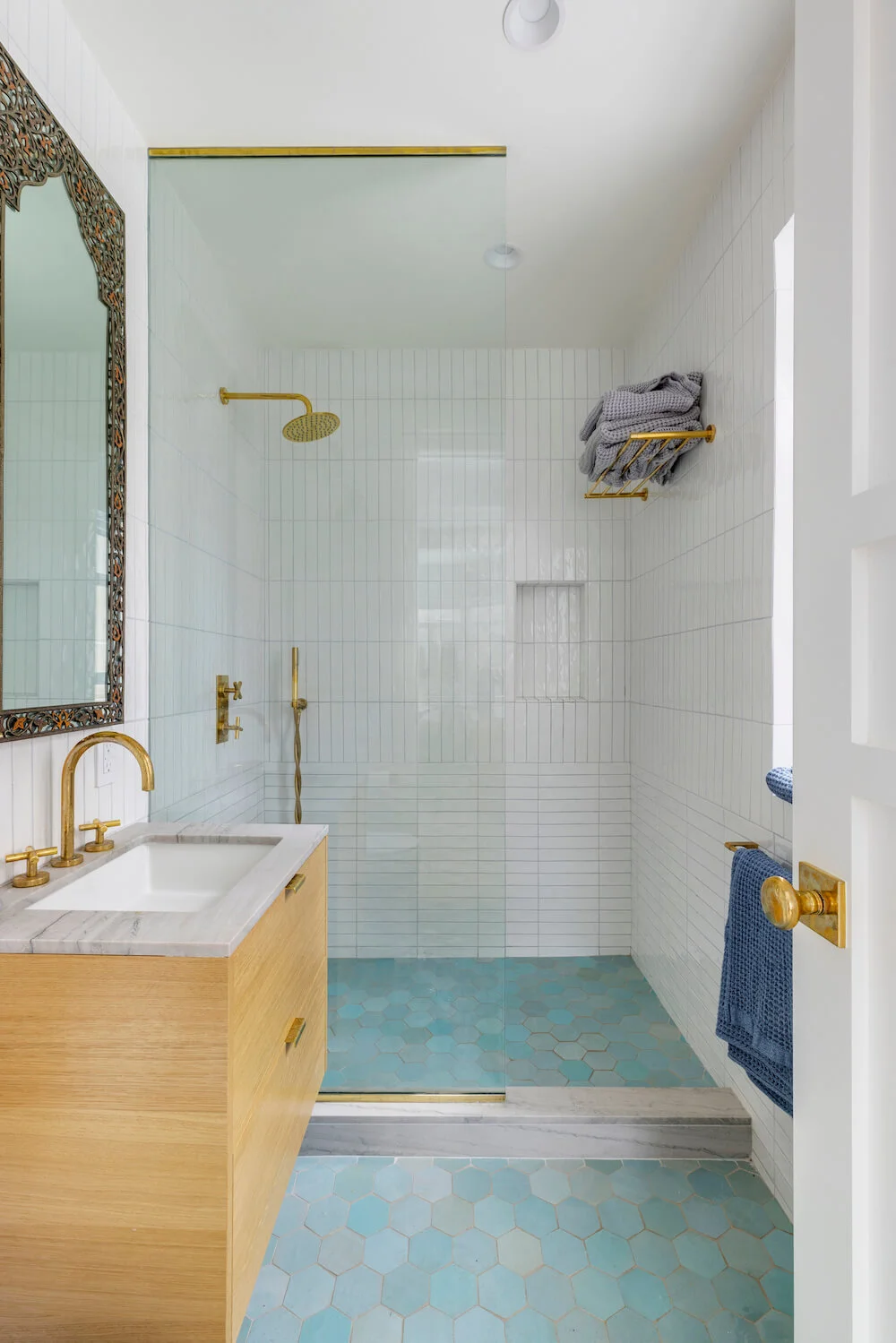
Architectural inspiration
My building was designed by an architect known for his remarkable art deco buildings on the Grand Concourse in the Bronx. Because of WWII, however, materials weren’t available to build until the mid-forties. This placed my building in the period when art deco was becoming streamlined, influenced by the form follows functional efficiency of the Bauhaus. Streamline moderne favors simpler, aerodynamic elegance; sleekly curved corners, with an emphasis on streamlined horizontal lines.
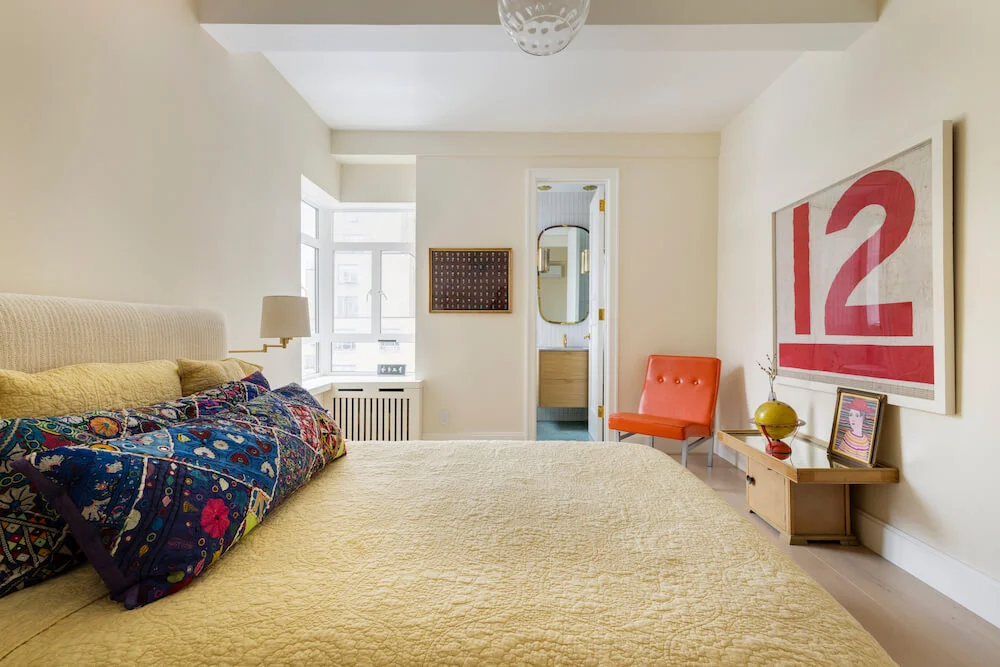
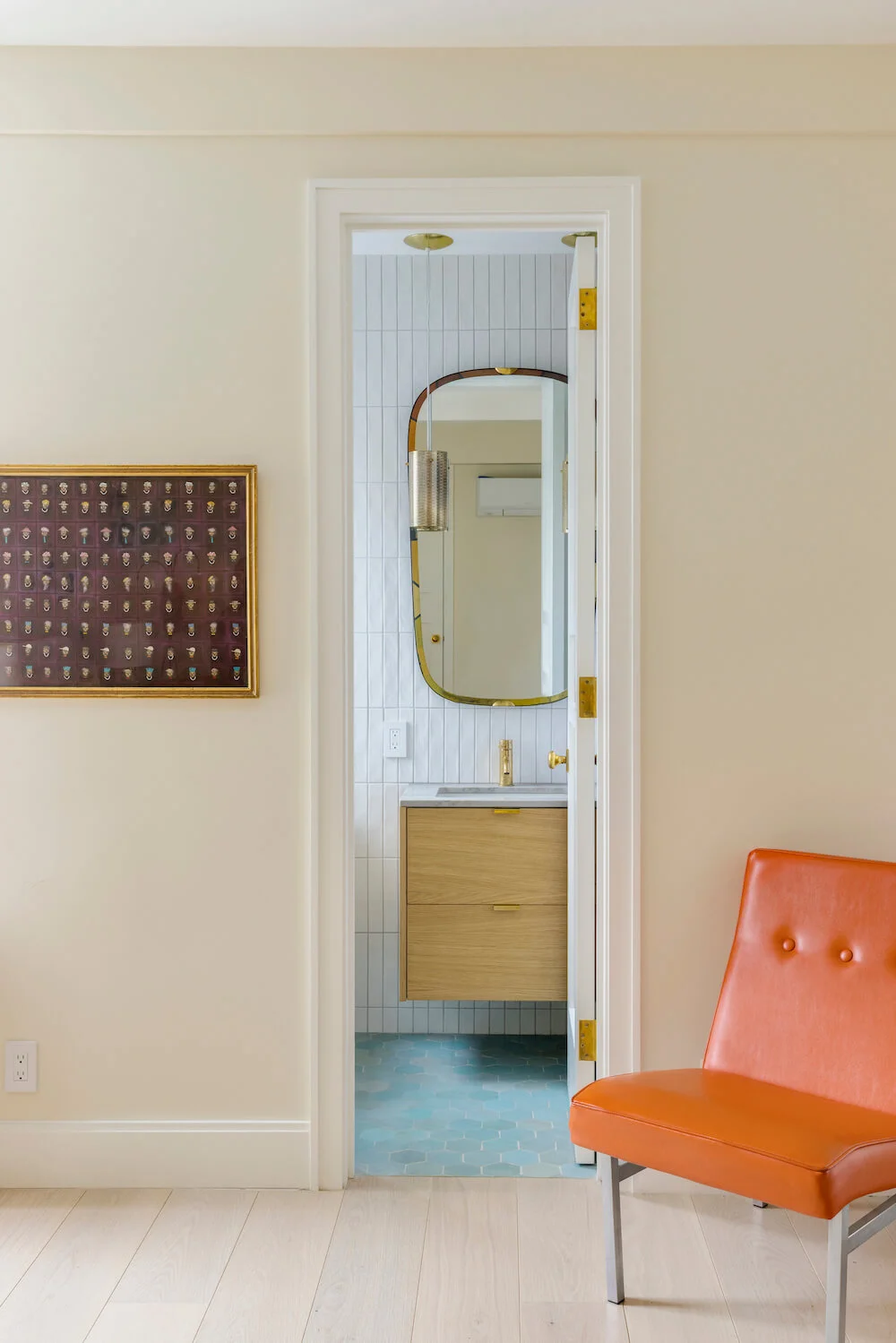
A new opportunity with the co-op board
The HVAC system added many months, many delays, and many unnecessary dollars to the budget. The co-op board had never allowed central air in the building, so I was the proverbial guinea pig. We often had to wait weeks and even months to get sign-offs from the building architect and the board. Fortunately, our contractor was nimbly able to juggle and move forward with other parts of the project. When August came and the penthouse could have been baking in the heat of the summer sun, I was grateful that I’d had the patience and tenacity to stick to my guns.
My interactions with the co-op board during the renovation process incentivized me to run for the board myself to help streamline the renovation process for future shareholders. I’m now the head of the co-op board’s Design Committee, overseeing upgrades to the lobby, corridors, and elevator.
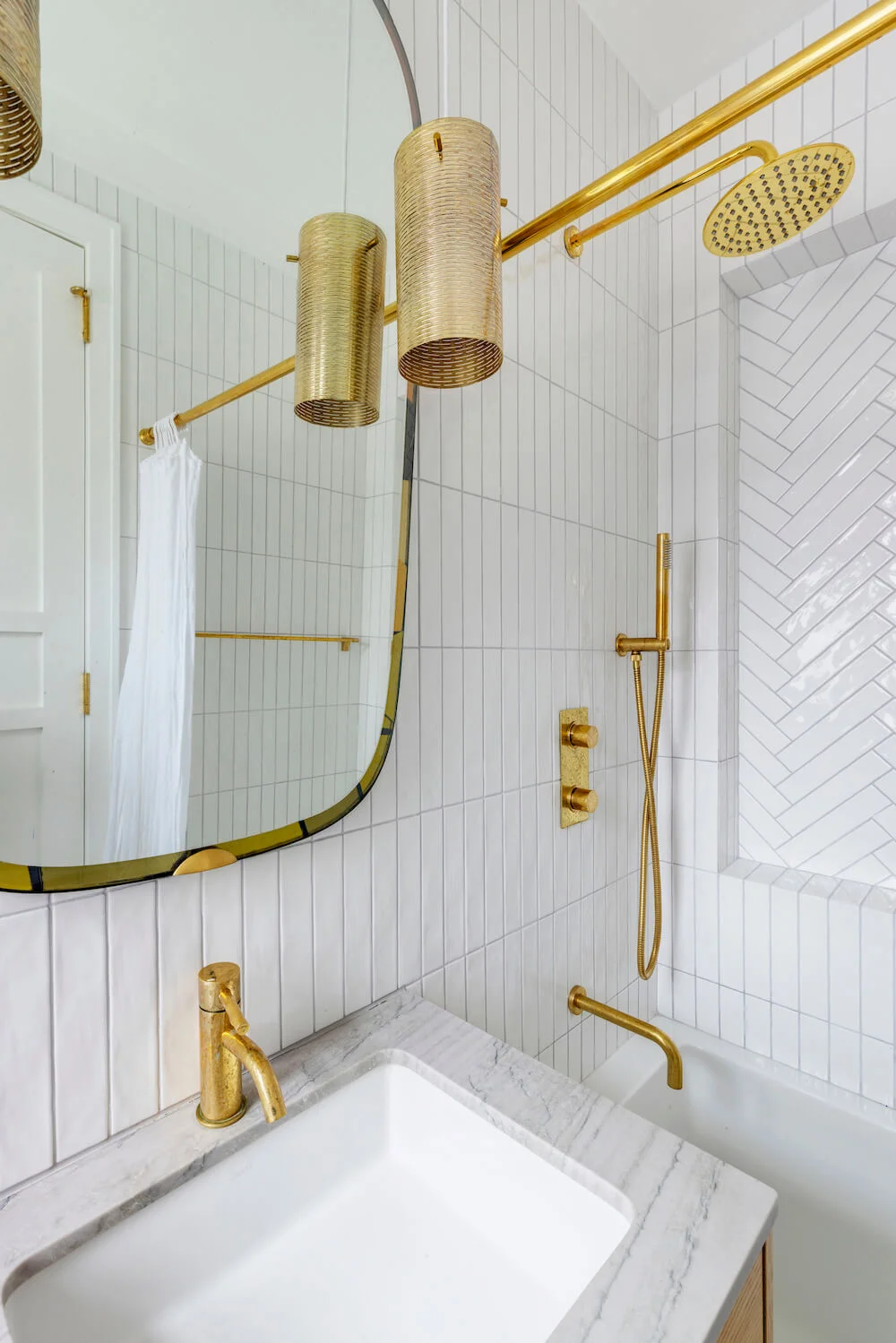
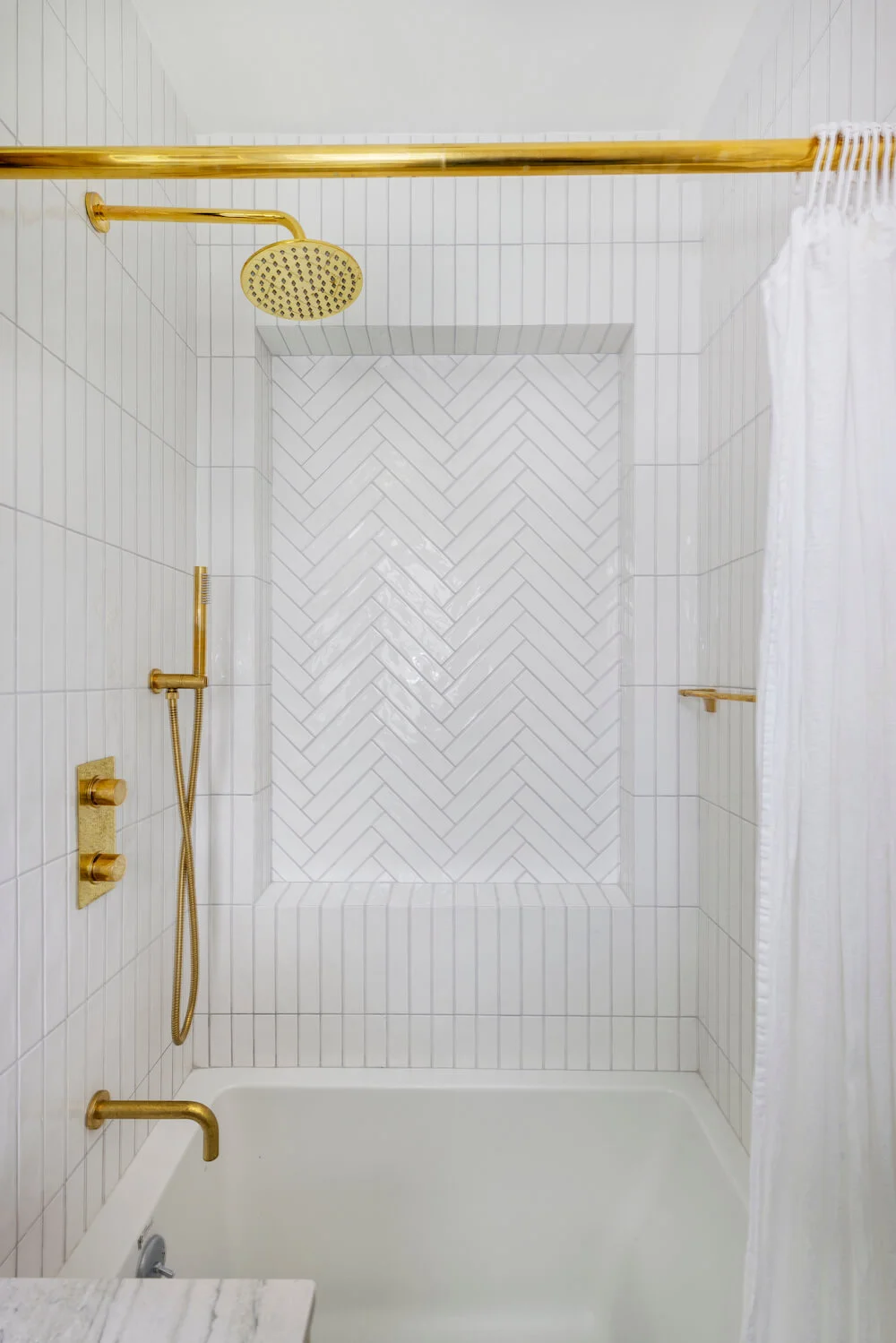
7 tips from a hands-on homeowner
1. If you can, do it yourself.
I sourced every finish, every tile, fabric, every can of paint. As a result, I never paid fees for purchasing materials. I was also in control of the budget on a visceral level; I was personally responsible for every penny that was spent. It was a lot of responsibility and time, but those hours represent enormous savings and kept me on budget.
2. Google is your friend.
When I went to NYC showrooms, I was shocked by the limited color options and the incredibly high prices for terrazzo tiles, which had suddenly become a trendy new material. I found a company in Wausau, Wisconsin that makes nothing but terrazzo – in every color imaginable, with eight blends of crushed stone chips from macro to micro. I chose the Reflections Series and specified that small pieces of mirror be crushed into the mix so that, when the sun hits the tile in exactly the right way, it creates a reflected burst of light.
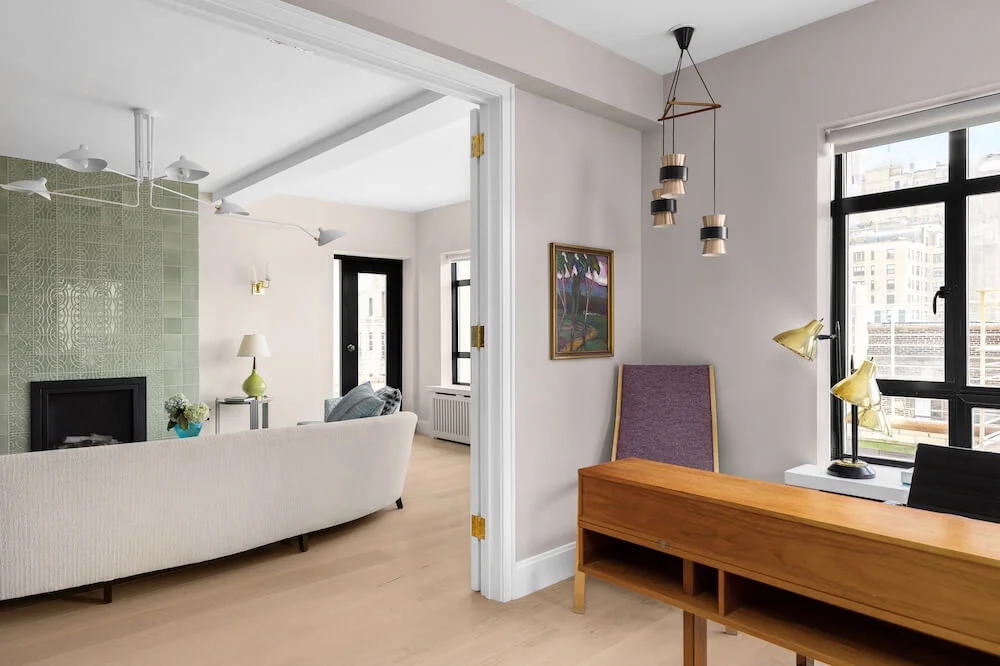
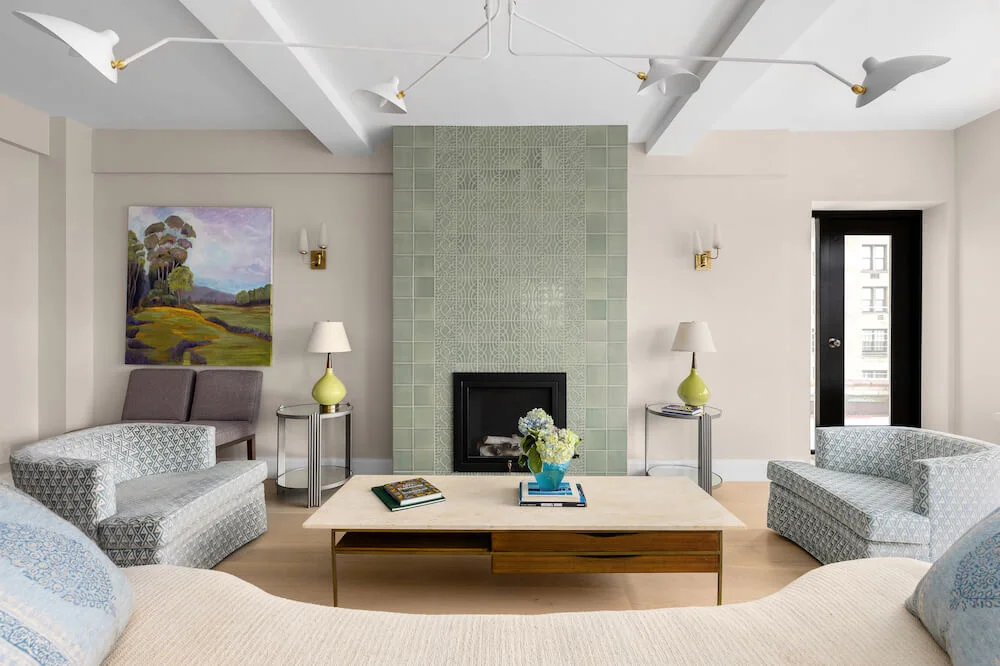
3. Never buy from big box design stores if you can find vintage.
My go-to resources were Chairish; Pamono; Etsy; and Live Auctioneers.com. Vintage pieces bring stories and histories, adding layers of authenticity and beauty to your design.
4. Lighting makes or breaks a space.
Natural light is key; that was a priority on my “must have” list. Then I searched the world to find focal point light fixtures that command attention: a BTC Original Rise ‘N Fall Pendant light over the kitchen counter; the Louis Poulsen “Patera” Fibonacci hanging pendant over the dining room table; matching Gerard Thurston for Lightolier perforated pendants bookending the bathroom mirror.
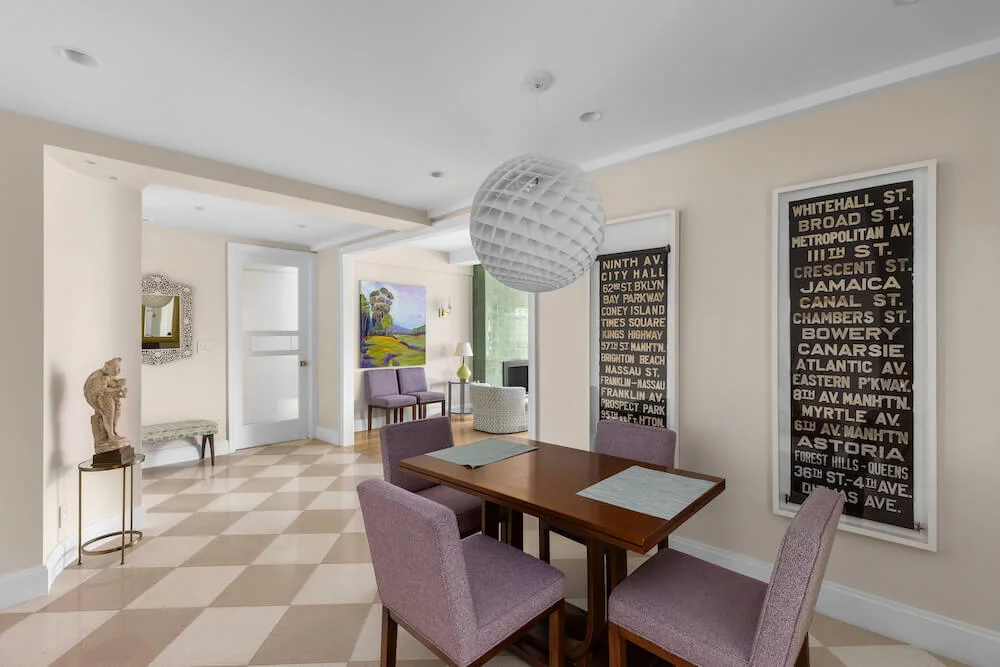
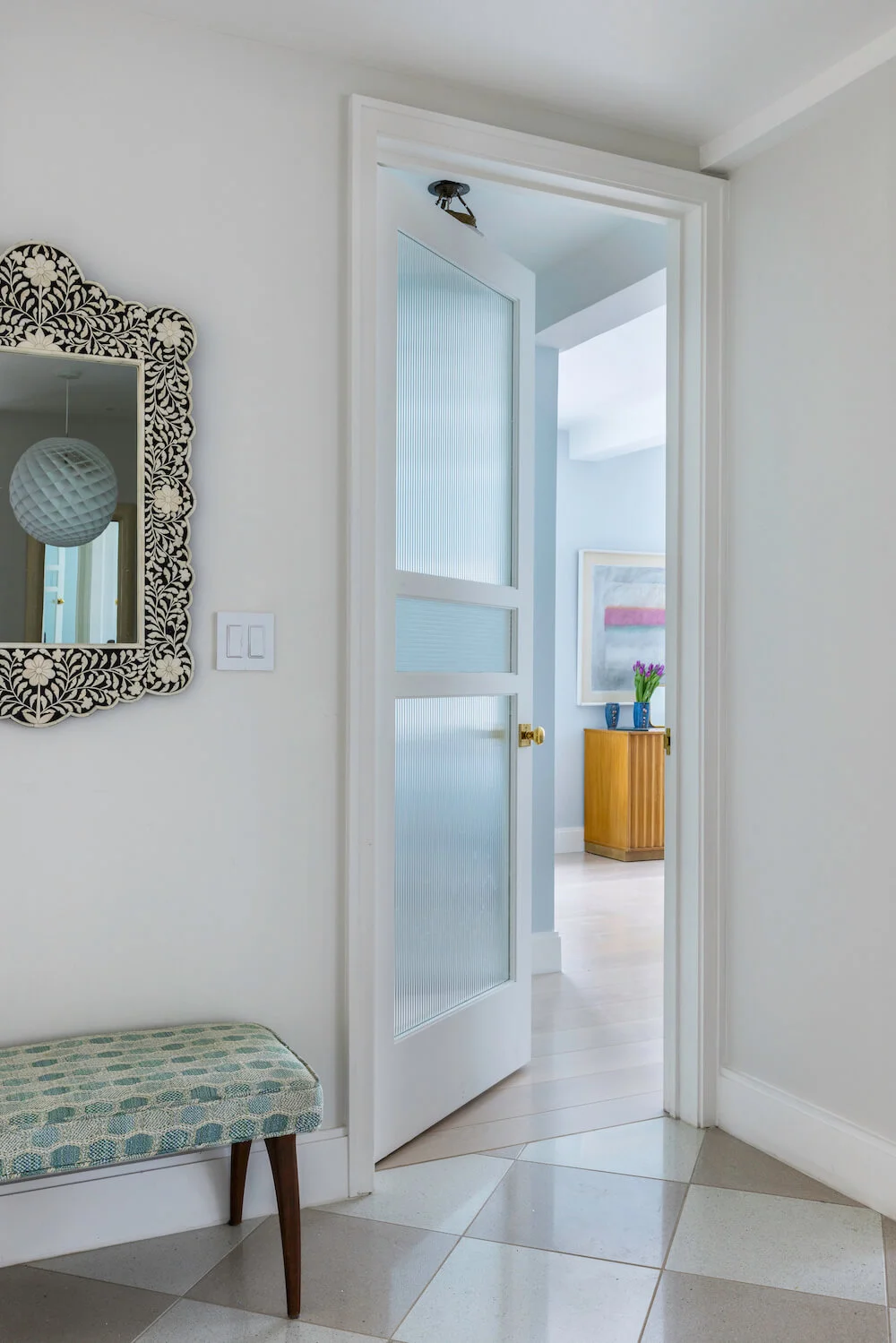
5. Save money by using inexpensive tile in fresh ways.
I went with an inexpensive classic 2″ x 10″ white subway tile in my New York-sized bathrooms. The tile is set in patterns – stacked horizontal up to chair rail height, stacked vertical above and, in the guest bathroom, a herringbone patterned niche contrasting with stacked vertical everywhere else. The patterns catch the eye and lend texture to what would otherwise read as standard issue tile.
6. Whenever possible, re-use, recycle.
By re-upholstering, repainting, or changing hardware, I was able to reuse every piece of furniture and art I’d collected over the years. Two beloved Bertoia chairs, two absurdly comfortable Milo Baughman tilt and swivel club chairs; and two prized Arne Jacobsen St. Catherine’s chairs were recovered by the extraordinary folks at Prestige Furniture and Design. My Mads Caprani standing lamps, Peter Lovig Neilsen writing desk (where I wrote my most recent novel, HANNAH’S WAR), and two cherished Henning Norgaard rosewood and glass side tables all found pride of place in my new home.
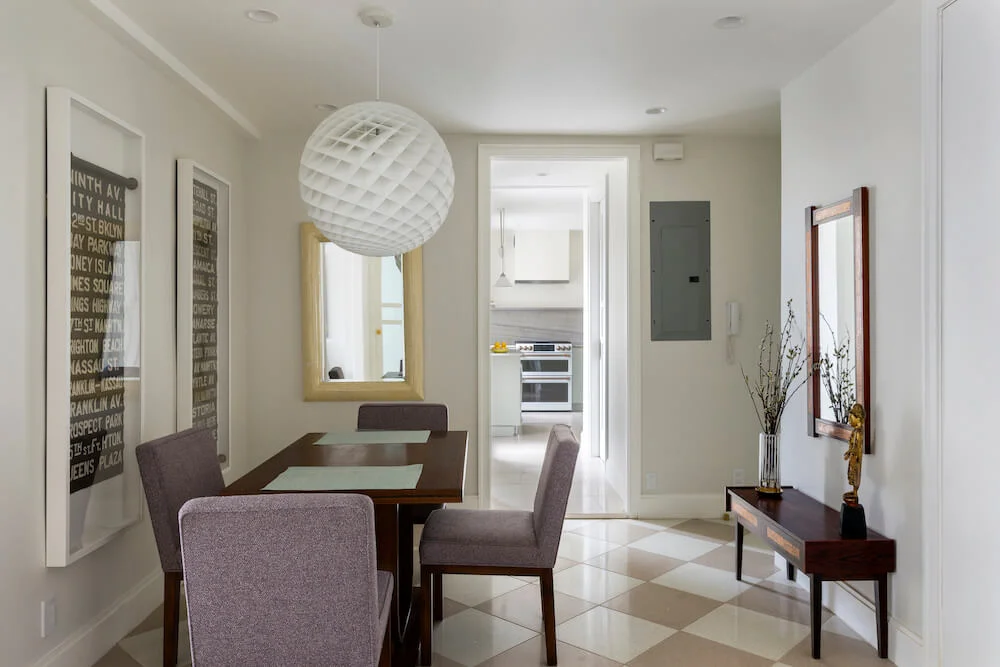
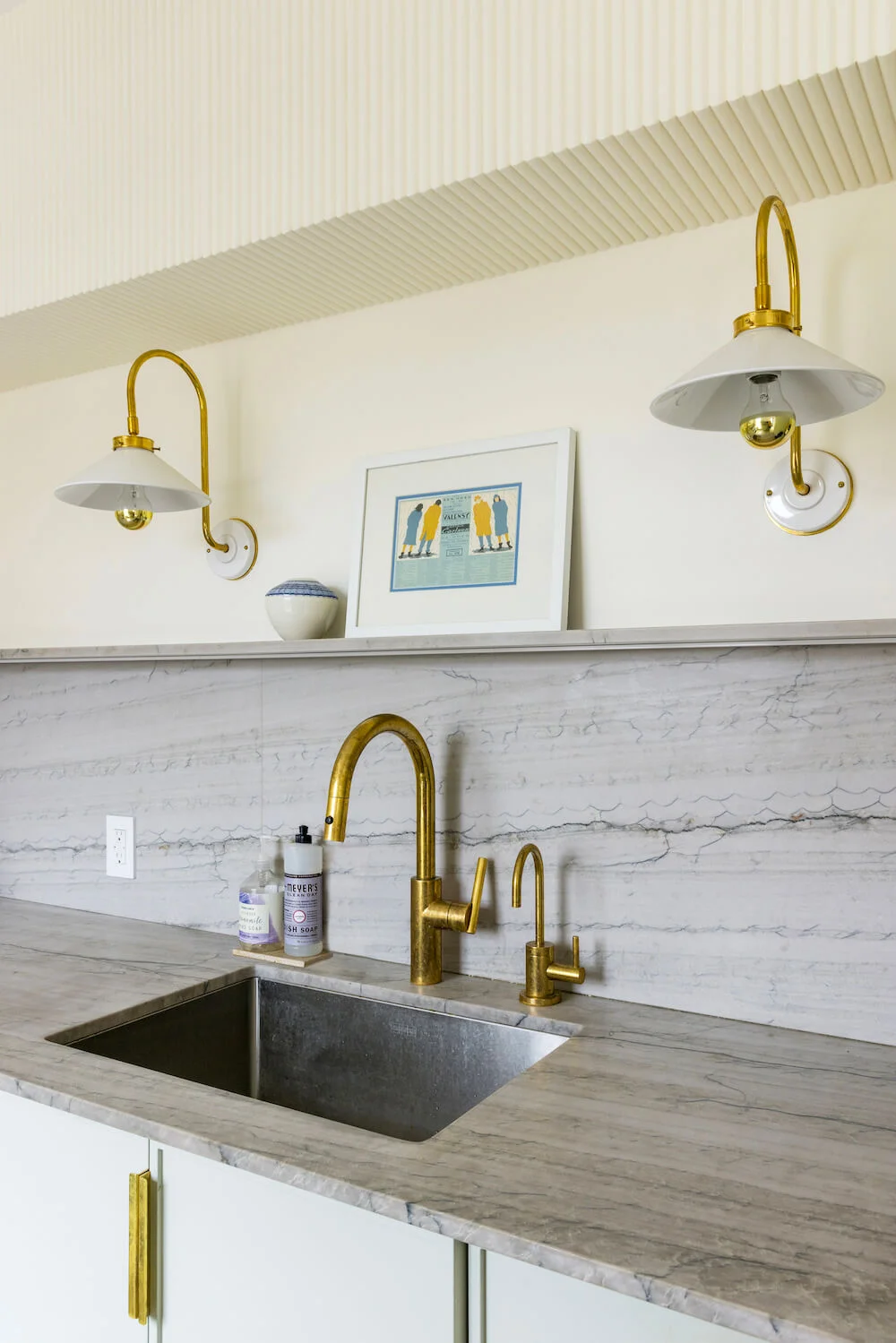
7. If you don’t fall in love, wait.
Don’t buy an apartment you don’t love; I looked at more than 100 apartments before I found the one that made my heart sing. It’s better to have no chairs at the dining room table if you haven’t found the right fabric. Haven’t fallen in love with wallpaper for the powder room? Keep scrolling through Pinterest until you see a pattern and colors you can’t live without (for me, it was C.F.A. Voysey’s Passion Flower in cornflower blue and yellow). Far better to stare at an empty wall over the sink than hang a boring mirror or medicine cabinet just to fill the space.
With everything finished except for landscaping on the terrace (soon…) I have an immense sense of satisfaction and gratitude. I wake up to the sun rising over Central Park in the morning and watch the sunset over the Hudson at night. Honestly, I can’t think of a thing I would do differently.
The only problem is that my renovating hobby has now become an obsession and I’m itching to find another project. So, if you encounter a listing that says, “Bring your contractor…” please send up a flare.
Thank you, Jan, for sharing your new home with us!
—
Sweeten handpicks the best general contractors to match each project’s location, budget, scope, and style. Follow the blog, Sweeten Stories, for renovation ideas and inspiration and when you’re ready to renovate, start your renovation with Sweeten.
RENOVATION MATERIALS
LIVING ROOM/FOYER RESOURCES:
- Jazz tile in Wasser glaze on fireplace: Rookwood Pottery
- Reflections Series 24” x 24” terrazzo foyer floor tile in Ivory and Latte: Wausau Tile
- French door hardware: Vintage
- Mouille Six-arm ceiling lamp: France and Son
- Ammonite paint on walls: Farrow and Ball
OFFICE RESOURCES:
- Peignoir paint on walls: Farrow and Ball
- Fog & Mørup Trio of Copper and Black Pendant Lights for Louis Poulsen: Vintage
KITCHEN RESOURCES:
- Kitchen cabinets: IKEA
- Cabinet doors/drawer fronts: NIEU.
- Mizzle paint on cabinets: Farrow & Ball
- Macaubus countertop and backsplash: BAS Stone
- Cobb Rise ‘N Fall Pendant light: Original BTC
- Lucia wall sconces (above sink): Hector Finch
- Franke CUBE stainless steel sink: Appliances Connection
- Faucet in unlacquered brass: PHYLRICH
- Café stove: Appliances Connection
KITCHEN PANTRY RESOURCES:
- Mizzle paint on cabinets: Farrow and Ball
- Wood countertop: IKEA
DINING ROOM RESOURCES:
- “Patera” Fibonacci hanging pendant: Louis Poulsen
POWDER ROOM RESOURCES (with wallpaper):
- Scarabeo wall-mounted ceramic sink: Nameek’s
-
Faucet with cross handles in unlacquered brass: PHYLRICH
- C.F..A. Voysey “Passion Flower” in cornflower blue and slate: Lord Twig Wallpapers
- Reflections Series terrazzo floor tile in Latte: Wausau Tile
GUEST BATHROOM RESOURCES (with soaking tub):
- Zellige 4″ hex floor tile in Tea Ceremony: Clé Tile
- 48″ x 32″ Drop-in soaking bathtub: Fine Fixtures
PRIMARY BATHROOM RESOURCES
- Zellige 4″ hex floor tile in Tea Ceremony: Clé Tile
- Shower fixtures in unlacquered brass: PHYLRICH
- Godmorgen vanity: IKEA
- Brushed white oak slab cabinet panels: The Cabinet Face
- Light fixture: Vintage
The post A Film Director and Novelist’s Apartment Remodel on the Upper West Side appeared first on Sweeten.
from Sweeten https://sweeten.com/sweeten-renovations/entire-home-renovations/apartment-remodel-on-the-upper-west-side/
via IFTTT
Comments
Post a Comment